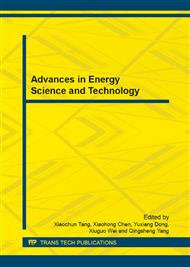p.1312
p.1318
p.1323
p.1327
p.1332
p.1336
p.1346
p.1353
p.1359
Research of Residents Cognitive and Attitude towards Renewable Energy
Abstract:
Recent years, the price rise of energy resource , the climate change caused by the abuse of fossil fuels, the Tokyo Protocols which limited the ejection of greenhouse gas and many other things have caused unprecedented huge impact and threat. Taiwan , which relies 98% on importing energy sources, has very little local energy source , very low reservation of petrol and very small proportion of self-running coal and gas facilities, therefore the energy security condition has become quite severe. This essay mainly discusses the cognition and attitude of community residents towards renewable energy in Taiwan, analyzes people’s different cognition and attitude, elaborates the correlation between cognition and attitude towards renewable energy and in the end offer some suggestions to the related professionals and researchers.
Info:
Periodical:
Pages:
1332-1335
Citation:
Online since:
February 2013
Authors:
Price:
Сopyright:
© 2013 Trans Tech Publications Ltd. All Rights Reserved
Share:
Citation:


